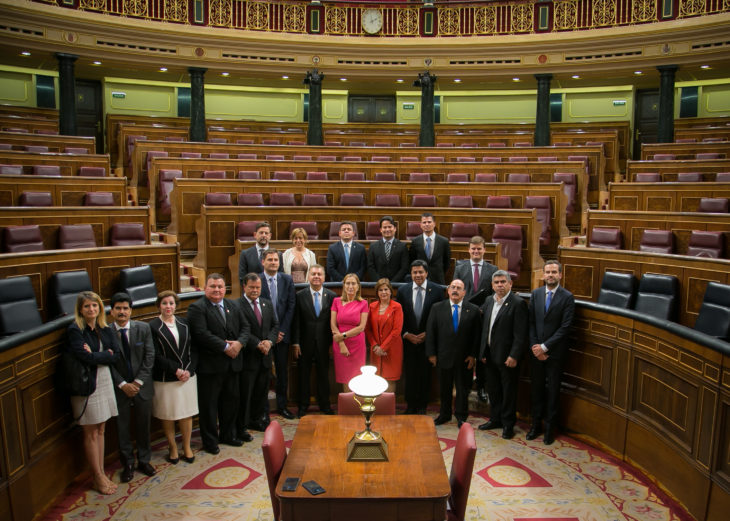EUROsociAL+ has been supporting the Central American country in the process of adopting a Law on Regional Development

Within the support framework the EUROsociAL+ Programme has been providing to Costa Rica in developing its public policies for social cohesion, a delegation of nine deputies from the Legislation Commission on Regional Development and two representatives from MIDEPLAN, had the chance to learn firsthand about the experiences of Spain and France in the area of regionalisation, decentralisation and territorial equity.
The EUROsociAL programme has supported the regional development and decentralisation policy of Costa Rica since its earlier phases, including adoption of Draft Law 19.959 “Regional Development in Costa Rica” by the Legislative Assembly. This exchange visit represents a final push for its immediate adoption by this Costa Rican legislative body.
The activity contemplated, in the first place, exchanges with Spain’s Secretariat of State for Territorial Administrations (SEAT) of the Ministry of the Presidency and the Sub-directorate General of Financing of the Self-governing Communities of the Ministry of Finance. In these, various experts explained the process of decentralisation undertaken in Spain after the Transition, as well as the system of financing of the self-governing communities. The managing director of Relations with Self-governing Communities and Local Entities, Enrique Lasso de la Vega, represented SEAT at this important meeting.
The delegation was received next by representatives of the commissions for International Cooperation, Ibero-American Affairs and Self-governing Communities of the Spanish Senate.
Speaking first, Senator Enrique Lasso de la Vega, representing Zamora, explained the process of transferring powers from the central government to the self-governing communities, highlighting the virtues of this experience, as well as lessons learnt that may be useful in defining the Law on Regional Development in Costa Rica. Next, Senator Clara San Damián, also representing Zamora, reflected on the different relationships between the central government and the self-governing communities. Lastly, Senator Asunción Sánchez, representing Alicante, stressed the importance of international cooperation with countries like Costa Rica and the need to involve citizens in the different institutional processes opened in each country.
The director of FIIAPP, Pedro Flores, thanked the Senate for once again opening its doors to his organisation and to the EUROsociAL+ Programme. The FIIAPP director himself would later accompany the Costa Rican delegation to Spain’s lower legislative chamber, where they were received by the president of the Congress of Deputies, Ana Pastor.
With the aim of learning the importance of the legislative process carried out in Spain, which started at the central level but later reached the regional level, they had the opportunity to travel to Cantabria and its capital of Santander to learn about the experience of a single-province community that most closely resembles the multilevel structure of Costa Rica. Representing the Government of Cantabria, the Councillor of the Presidency and Justice, Rafael de la Sierra welcomed the delegation and indicated the important role the process had in guaranteeing equality of rights in basic services across the entire territory.
They also had the opportunity to meet with their counterparts in the Parliament of Cantabria. The president, Dolores Gorostiaga, and members of the Parliamentary Commission of the Presidency and Justice exchanged experiences with the deputies concerning the rules that govern the daily work of the regional parliaments and the structure and powers of the administrations in Cantabria.
The visit ended with a visit to the project: Environmental Hydraulics Institute at the University of Cantabria (IHCantabria), where Professor Iñigo J. Losada Rodríguez, Director of Research of IH Cantabria and Lecturer at the University of Cantabria explained the development of same as a field experience initiated by the regional government.
Lastly, at the Paris offices of the French coordinating partner of the EUROsociAL+ Programme, Expertise France, the expert Patrick BROUDICdemonstrated how the French case, given its institutional idiosyncrasy, is an experience closer to the Costa Rican one. The decentralisation process initiated in the 80s focused on territorial planning as an intense concern in the country and with higher levels of concentration than in the Spanish case.
All of this allowed the members of the delegation to gain a broad and contrasting vision of two different models involving decentralisation processes at different levels. Both of them have been fundamental for addressing the problems of territorial inequality, highlighting the importance of achieving higher levels of development in areas that are lagging, which will in turn allow the greater social cohesion desired by Costa Rica.
EUROsociAL+. Área de políticas de gobernanza / governance policies unit, FIIAPP




